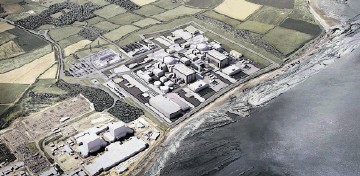
The Hinkley Point nuclear power station project suffered a fresh setback as it emerged trade unions are “unlikely” to back the scheme, which is being developed by French energy giant EDF.
The £18 billion project to build the new plant in Somerset would not be given the French unions’ blessing in its “current state”, the secretary of EDF’s central works committee said.
EDF’s chief executive Vincent de Rivaz told MPs on Tuesday that he was confident the plan would go ahead but the company had decided to consult French trade unions after some of them called
for a delay of two to three years because of concerns over the impact of the project on the firm’s finances.
French economy minister Emmanuel Macron told MPs that owing to the importance of the project, EDF had decided to promote “exemplary labour/management dialogue” by consulting the Central Works Committee on the project.
Now Jean-Luc Magnaval, secretary of that committee, has revealed unions are demanding further information from EDF and could not back the current plans.
He told BBC2’s Newsnight: “We have reservations about several aspects of the project – organisation, supply chain, installation, and procurement.
“The trade unions are unlikely to give their blessing to the project in its current state. We are not reassured by the documents we have received. We have been given a marketing folder not the full information we require.”
Mr de Rivaz told MPs on the Energy and Climate Change Committee that money was in place and no project had been better prepared.
But he said there was a “difference of opinion” with some French unions over Hinkley, adding: “We hope those differences will be resolved during the consultation.”
He said he understood the “impatience” of the MPs on the delay: “The team has the same impatience, but we have to remain calm.”
Mr de Rivaz said the £18 billion cost of the project had not changed and still had the full support of the French government and partners, the China General Nuclear Power Corporation.
He insisted the project was not on hold, and “everything was set” for power to be generated by 2025.
The consultation with the unions started on May 2 and is due to last 60 days, after which a final investment decision would be “very rapid”, the EDF chief executive said.
Recommended for you
